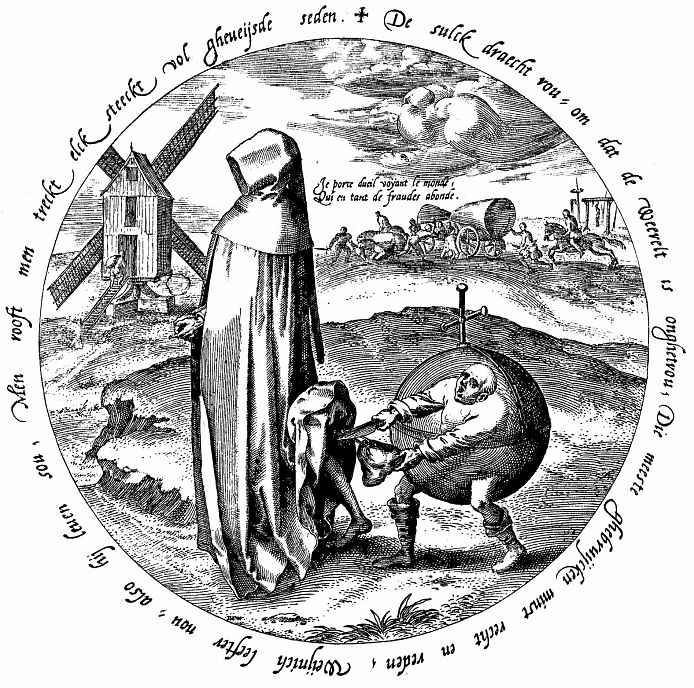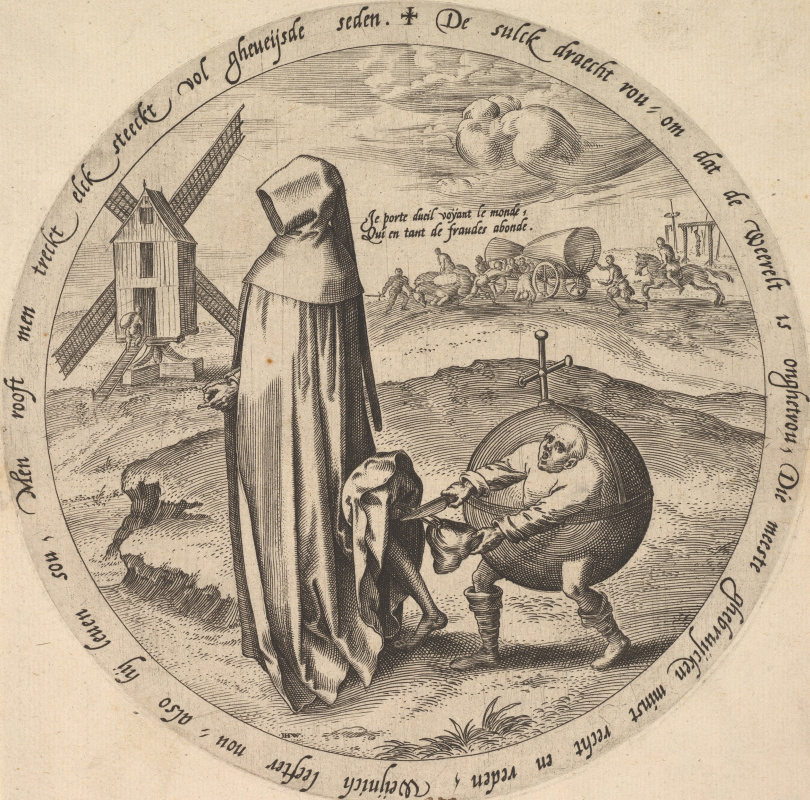log in
Enter site
Login to use Arthive functionality to the maximum
Misanthrope. Tondo
Pieter Bruegel The Elder • Arte gráfico, 1568, 17.7×17.7 cm
Descripción de la obra «Misanthrope. Tondo»
"The misanthrope" – famous work of Pieter Bruegel the Elder (CA. 1568, tempera on canvas, dimensions: 88 * 85 cm). Today it is located in Naples (national gallery of Capodimonte).
This is one of the final works in the creative heritage of the painter. She created only a year before his death. And at the beginning and at the end of his journey, the artist talked about the depravity and stupidity of man, and of mortal life.
The painting depicts a young evil midget who steals a purse from a sullen monk. The thief is in the sphere with the cross, which is symbolic representation of the vices of the earthly world. This picture master full of sarcasm, some irony. The first attempt of the description of the painting "the Misanthrope" by Pieter Bruegel is difficult to understand what it meant to the artist, creating this fabric. But when you consider every depicted detail, comes to understand the General message of the master.
On the painting "the Misanthrope" painter Pieter Bruegel there is an inscription that says: the world is so insidious that followed in mourning clothes. The letters were written by another hand – probably later, but it is generally believed that the essence of this text coincides with what wanted to say us. On the face of the monk, located in a dominant position, nadenut hood. Because of it's edge shows a hooked nose, grizzled beard. Hands are in the gesture of prayer, which specifically declares the piety of this character. However, it is hypocritical: back from under the robes of a monk peeking out a tightly-clasped purse, shaped like heart. Perhaps, then, the master was guided by a Maxim from the gospel, "Where wallet is, there the heart".
As if the monk wanted detachment from the world, it is impossible to achieve. Deceit demonstrates not only the young thief, but of the three traps, which are placed on the road for a misanthrope. The duplicity of this character is a hint to the clergy.
On the plane of plains in the distance is a small figure of a Shepherd, surrounded by a herd of peacefully grazing sheep. This is the background of the painting "the Misanthrope" by artist Pieter Brueghel . At the horizon we see the motif in this artist – the windmill. The gloom of a monk is contrasted with the Shepherd who guards the sheep – he is full of anxiety about his players. According to the traditions that come from the old Testament, the image of the shepherd represents Jesus Christ.
The round shape of the image is not characteristic of Bruegel. Judging by his paintings, which have reached our time, he spoke to her only twice: in 1558-m in preparation for "the Flemish Proverbs" and "the Misanthrope" 10 years later. Then he returned to the abandoned technology — worked with oil on wood and tempera on canvas.
Bruegel as the author of so many faces he medieval moralist, and painter of the word understand today. This Northern artist, the painting which reveals the influence of Italy. The greatness of the master is to establish strong ties between man and nature, in a deeply humane understanding of Christian history as a living reality.
This is one of the final works in the creative heritage of the painter. She created only a year before his death. And at the beginning and at the end of his journey, the artist talked about the depravity and stupidity of man, and of mortal life.
The painting depicts a young evil midget who steals a purse from a sullen monk. The thief is in the sphere with the cross, which is symbolic representation of the vices of the earthly world. This picture master full of sarcasm, some irony. The first attempt of the description of the painting "the Misanthrope" by Pieter Bruegel is difficult to understand what it meant to the artist, creating this fabric. But when you consider every depicted detail, comes to understand the General message of the master.
On the painting "the Misanthrope" painter Pieter Bruegel there is an inscription that says: the world is so insidious that followed in mourning clothes. The letters were written by another hand – probably later, but it is generally believed that the essence of this text coincides with what wanted to say us. On the face of the monk, located in a dominant position, nadenut hood. Because of it's edge shows a hooked nose, grizzled beard. Hands are in the gesture of prayer, which specifically declares the piety of this character. However, it is hypocritical: back from under the robes of a monk peeking out a tightly-clasped purse, shaped like heart. Perhaps, then, the master was guided by a Maxim from the gospel, "Where wallet is, there the heart".
As if the monk wanted detachment from the world, it is impossible to achieve. Deceit demonstrates not only the young thief, but of the three traps, which are placed on the road for a misanthrope. The duplicity of this character is a hint to the clergy.
On the plane of plains in the distance is a small figure of a Shepherd, surrounded by a herd of peacefully grazing sheep. This is the background of the painting "the Misanthrope" by artist Pieter Brueghel . At the horizon we see the motif in this artist – the windmill. The gloom of a monk is contrasted with the Shepherd who guards the sheep – he is full of anxiety about his players. According to the traditions that come from the old Testament, the image of the shepherd represents Jesus Christ.
The round shape of the image is not characteristic of Bruegel. Judging by his paintings, which have reached our time, he spoke to her only twice: in 1558-m in preparation for "the Flemish Proverbs" and "the Misanthrope" 10 years later. Then he returned to the abandoned technology — worked with oil on wood and tempera on canvas.
Bruegel as the author of so many faces he medieval moralist, and painter of the word understand today. This Northern artist, the painting which reveals the influence of Italy. The greatness of the master is to establish strong ties between man and nature, in a deeply humane understanding of Christian history as a living reality.



